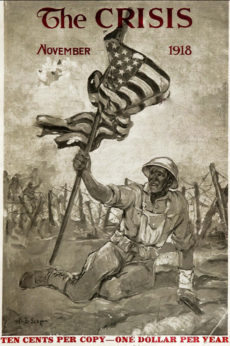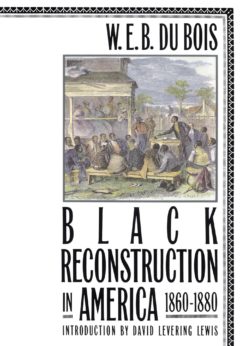
One of the greatest scholars, thinkers and activists for African American liberation was born on this date in 1868 in Great Barrington, Mass. “The cost of liberty,” he wrote in 1909, “is less than the price of repression.”
 William Edward Burghardt DuBois received two B.A. degrees – from Fisk University in 1888 and from Harvard in 1890 – and he was the first African American, in 1895, to receive a Ph.D. from Harvard. He was a professor of economics and history at Atlanta University, 1896-1910. From 1910-32 he edited The Crisis, magazine of the National Association for the Advancement of Colored People (NAACP), which he helped to found in 1909. After 1932 he returned to Atlanta as professor of sociology. He served as editor of the Atlanta University “Studies of the Negro Problem” from 1897-1911.
William Edward Burghardt DuBois received two B.A. degrees – from Fisk University in 1888 and from Harvard in 1890 – and he was the first African American, in 1895, to receive a Ph.D. from Harvard. He was a professor of economics and history at Atlanta University, 1896-1910. From 1910-32 he edited The Crisis, magazine of the National Association for the Advancement of Colored People (NAACP), which he helped to found in 1909. After 1932 he returned to Atlanta as professor of sociology. He served as editor of the Atlanta University “Studies of the Negro Problem” from 1897-1911.
DuBois rose to national prominence as the leader of the Niagara Movement, a group of African American activists who wanted equal rights for blacks. DuBois and his supporters opposed the Atlanta Compromise, an agreement crafted by Booker T. Washington of the Tuskegee Institute, which provided that Southern blacks would submit to white political rule, while Southern whites guaranteed that blacks would receive basic educational and economic opportunities. Instead, DuBois insisted on full civil rights and increased political representation and believed that African Americans needed access to advanced education to develop the community’s leadership.
Racism was the main target of DuBois’s work. He strongly protested against lynching, Jim Crow laws, and discrimination in education and employment. His cause included people of color everywhere, particularly Africans and Asians. He was a proponent of Pan-Africanism and helped organize several Pan-African Congresses to fight for independence of the African colonies from European powers.
Anti-capitalist, peace activist, communist
DuBois believed that capitalism was a primary cause of racism, and he sympathized with socialist causes throughout his life. He was an ardent peace activist and advocated nuclear disarmament. In 1950 he became chair of the newly created Peace Information Center (PIC), which worked to publicize the Stockholm Peace Appeal in the U.S. The appeal set out to gather signatures on a petition to governments around the world to ban all nuclear weapons. The U.S. Justice Department alleged that the PIC was acting as a foreign agent, and thus required the PIC to register with the government. Du Bois and other PIC leaders refused and were indicted for failure to register. Some of Du Bois’s associates, notably in the NAACP, refused to support him, although many labor figures and leftists, including Langston Hughes, did. After a trial in 1951, with defense attorney Vito Marcantonio arguing the case, the case was dismissed. Nevertheless, the government confiscated Du Bois’s passport and withheld it for eight years, until the Supreme Court decided that it was unconstitutional for the State Department to deny a passport to a U.S. citizen for political reasons. DuBois was unable to attend the 1955 Bandung conference in Indonesia, a meeting of 29 nations from Africa and Asia, many recently independent, representing most of the world’s people of color.
In 1958, Du Bois regained his passport, and with his second wife, Shirley Graham DuBois, he traveled around the world, visiting both Russia and China, where, at the age of 90, he was celebrated with great honor.
In 1961 the Supreme Court upheld the 1950 McCarran Act, a key piece of McCarthyism legislation which required communists to register with the government. To demonstrate his outrage, DuBois, now 93, joined the Communist Party USA in October 1961. He wrote: “I believe in communism. I mean by communism, a planned way of life in the production of wealth and work designed for building a state whose object is the highest welfare of its people and not merely the profit of a part.
Death in Africa
 While visiting Ghana in 1960, DuBois entertained the idea of creating a new encyclopedia of the African diaspora, the Encyclopedia Africana. In early 1961, Ghana notified him that they had appropriated funds to support the project, and invited him to come to Ghana and manage the project. In October of that year, DuBois and his wife moved there to commence work. When in early 1963 the U.S. refused to renew his passport, he made the symbolic gesture of becoming a citizen of Ghana.
While visiting Ghana in 1960, DuBois entertained the idea of creating a new encyclopedia of the African diaspora, the Encyclopedia Africana. In early 1961, Ghana notified him that they had appropriated funds to support the project, and invited him to come to Ghana and manage the project. In October of that year, DuBois and his wife moved there to commence work. When in early 1963 the U.S. refused to renew his passport, he made the symbolic gesture of becoming a citizen of Ghana.
His health declined during his two years in Ghana, and he died on August 27, 1963, in the capital of Accra, at age 95. He was buried in Accra near his home, which is now the DuBois Memorial Centre. A day after his death, at the March on Washington, speaker Roy Wilkins asked the hundreds of thousands of marchers to honor DuBois with a moment of silence.
Among DuBois’s major works are The Souls of Black Folk, John Brown, The Negro, Darkwater, and Black Reconstruction in America.
Schools, libraries and cultural centers are named in honor of W.E.B. DuBois. In 1992, the United States Postal Service issued a 29-cent stamp to honor DuBois, an open member of the Communist Party.
Photo: DuBois at around the age of 50. | Wikipedia (CC)











